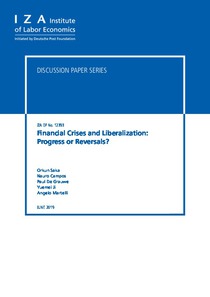Financial crises and liberalization: progress or reversals?

Saka, Orkun ; Campos, Nauro F. ; De Grauwe, Paul ; Ji, Yuemei ; Martelli, Angelo
Institute of Labor Economics, Bonn
IZA - Bonn
2019
48 p.
financial reform ; economic recession ; financial market
Discussion Paper
12393
Financing and monetary policy
English
Bibliogr.
Financial crisis can trigger policy reversals, i.e. they can lead to a process of re- regulation of financial markets. Using a recent comprehensive dataset on financial liberalization across 94 countries for the period between 1973 and 2015, we formally test the validity of this prediction for the member states of the European Union as well as for a global sample. We contribute by (a) using a new up-to-date dataset of reforms and crises and (b) subjecting it to a combination of difference-in-differences and local projection estimations. In the global sample, our findings consistently confirm that crises lead to a reversal of liberal reforms, suggesting that governments react to crises by re-regulating financial markets. However, in a dynamic setting with impulse-responses, we also find that these new regulations are only temporary and a liberalization process restarts a few years after a financial crisis. One decade later, financial markets have returned to their pre-crisis level of liberalization. In the EU sample, however, we do not find sufficient evidence to support these observations."
Digital
The ETUI is co-funded by the European Union. Views and opinions expressed are however those of the author(s) only and do not necessarily reflect those of the European Union or the ETUI.